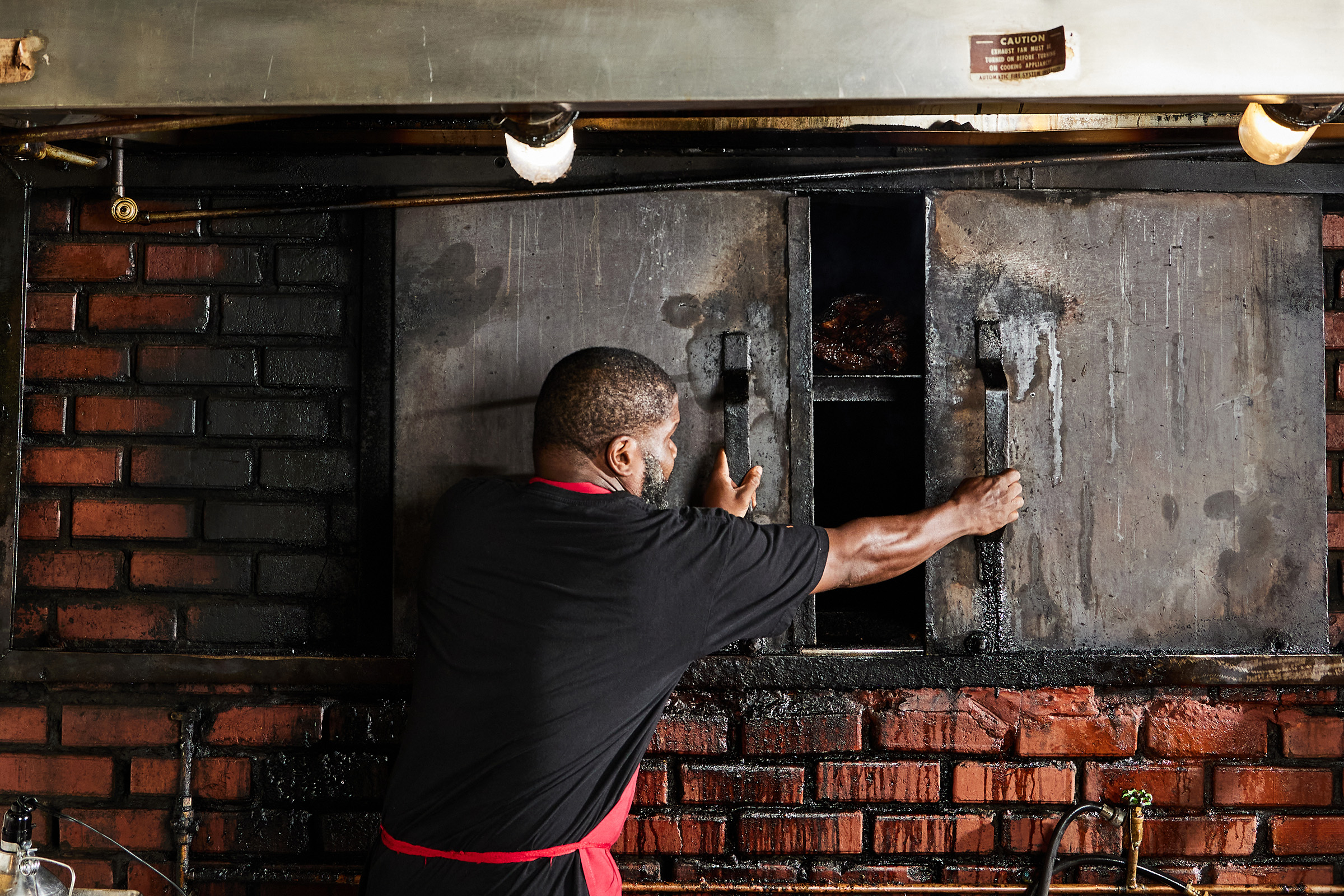
We hit the pits. We’ve been everywhere over the years, and we revisited dozens of top KC barbecue spots over the summer to make this list.
We like smoke. Great barbecue can be made in lots of ways, but we admit a preference for traditional methods using live fire.
No favoritism. This list is not influenced by advertising or personal relationships. We do not accept free food in the judging process.


In the four years Chef J has been open, the platters keep getting bigger.
“That’s what we want,” says owner and pitmaster Justin Easterwood. “When we opened, people weren’t used to the sell-out method, and now they are, so they get there early and they don’t have a problem bringing some food home with them. People know they need to load up.”
Count us among those who are fully locked and loaded at this pit operating out of the snack counter in a West Bottoms haunted house.
The ribs, especially, have become unmatched, something Easterwood attributes to a pilgrimage he made to Texas, where he learned a few new tricks of the trade from Lone Star standouts like Interstellar BBQ’s Carlos Cruz and Franklin Barbecue’s Aaron Franklin, both in Austin.
“I know how to barbecue myself, but when I’m out there talking to these people, it’s that little stuff I pay attention to,” Easterwood says. “What [Carlos] told me was exactly the problems I was experiencing with my ribs, which was from how we wrapped and held them. Not that we changed a lot, but it really made a difference.”
Easterwood also learned a philosophy of trimming—specifically, that you should trim a little tighter so the patrons aren’t pulling your ribs apart to remove large white hunks of fat. “That bark is your flavor profile for your entire piece of meat,” he says. “You need the correct amount of fat left so it caramelizes and renders down but also so people eat it. If there’s too much fat, they’ll just pull it all off and there goes your flavor.”
Chef J has always been consistent. At a time when too many other Texas-influenced upstarts are diluting their quality in a quest to branch out with smoked squid ink pasta and artisan corn dogs, Chef J’s consistency is especially admirable and appreciated. It’s what won Chef J the top spot on this list.
“Consistency is the number one thing for me in this game,” Easterwood says. “We set our standards high, but the customers set our standards high as well. They come in wanting a very good experience because we’re talked about highly. I one hundred percent want to give that customer a true, authentic barbecue experience.”
Chef J is also now serving at Chiefs games, taking over a kiosk in section 107 on the home sideline. Easterwood is also opening a new full-service restaurant at the Pennway Point development, a new entertainment district next to I-35 south of downtown that will be anchored by a one-hundred-and-fifty-foot ferris wheel. “We’re going to be seven days a week, lunch and dinner, and we’re going to be able to have some brunch items as well,” he says. “We’re going to be able to take our game to the next level.”
That space will be served by four one-thousand-gallon wood-burning smokers.
“We’re growing and we’re taking it to the next level, but we’re not changing our mindset quality-wise,” Easterwood says. “I’m still cooking over live fire, and these fires will be burning all day and all night.” MC.
Tray Way
There’s always a tray, often aluminum, sometimes plastic, usually covered with heavily branded paper.
Sliced Thrice
The ribs are cut by the bone instead of being presented as a half or whole rack. The brisket is served in slices without sauce. The sausage is usually sliced up instead of served by the link. Why? The bourgeoisie hate using knives, obviously.
Purp Walk
There are almost always bright-purple pickled onions, which look very nice on Instagram. Are these edible, like parsley, or ornamental? Best to ask.
Check, Please
A spread like this will set you back at least $50, probably closer to $100.



We’ve seen Peak Platter. In the last five years, unsauced sliced brisket plated on a tray with white bread and pickles, the Texas way, has become a trendy food across the country. KC has a half-dozen solid spots, but you can also find respectable brisket in Indianapolis or Idaho Falls.
The next big trend in barbecue is the opposite of old-school traditionalism. It’s the brisket fried rice at Blood Bros. of Houston and the Ethiopian awaze-glazed brisket at Smoke’N Ash BBQ of Arlington. Some call it fusion, but Buck Tui’s owner and pitmaster Ted Liberda prefers “crossover.”
“I hate the word ‘fusion,’” he says. “It indicates that it’s not authentic. It’s the evolution of barbecue for the modern day.”
Liberda, who grew up working at his family’s local Thai restaurants and owns Waldo Thai with his wife, Pam, started Buck Tui as a pop-up. It made this list two years ago while operating out of a trailer at the Overland Park farmers market. The operation and menu has grown beautifully since, taking over the former Plowboys location on 75th Street. A larger menu, great cocktail selection and comfortable dining room have made it a go-to spot when I have out-of-town visitors. It was my seventy-five-year-old mother’s favorite spot on a marathon tour of KC’s elite eats last Christmas. Buck Tui is one of a handful of Thai BBQ spots around the country. But unlike spots like Eem in Portland, where the curries steal the show, Buck Tui hews far closer to Midwestern culinary tradition. Take the X Man sandwich with brisket, papaya salad and tiger cry sauce or the brisket rangoons.
“It was important to me to emphasize Kansas City barbecue because it is a part of everything we do,” Liberda says. “We’re always evolving, trying to stay ahead of the game. When you’re mixing barbecue and Thai food together, there’s so much you can do.
Where to take it from here? Peak platter may be past, but peak pickleball is still looming. The casual paddle sport continues to grow at a breakneck clip, with several local spots like Chicken N Pickle and Serv offering courts alongside mid-grade food and drink offerings. Liberda has his eye on a Thai BBQ pickleball spot next.
“Pickleball is huge, man,” he says. “We need a pickleball place that’s exclusive, smaller-scale, with four courts or something like that, and a good restaurant where you can sit down and get a good meal. Something different.” MC.


“I think it’s fairly safe to say that I’m the only British guy doing Kansas City barbecue in Kansas right now,” says Q39 pitmaster Philip Thompson.
Thompson might be selling himself a little short: We’re pretty sure he’s the only one doing it in Missouri, too. He’s certainly the only Kansas City chef taking trips to Scotland to learn the fish-smoking traditions of the whisky peat bogs—only to bring it back as an oak-smoked salmon dip.
The south of England native is also a classically trained chef in the French tradition, a veteran of four-diamond hotel restaurants, a certified barbecue judge and a rooftop beekeeper.
In short, Thompson is the perfect heir to the iconic Midtown and Overland Park barbecue restaurants begun by Kansas City barbecue legend Rob Magee, who lost his fight with cancer in late 2021.
Q39 has always been an outlier in Kansas City barbecue, with a pedigree straddling barbecue competition trophies and highfalutin’ culinary degrees. The restaurant isn’t fancy. But it isn’t not fancy either. Instead, it takes a smoky art forged on blacktop and gravel and turns it over to a classically trained chef’s devotion to the moisture and tenderness of meat.
Kansas City, the crossroads of barbecue, is where a place like Q39 gets made. It’s a city that has absorbed every smoked meat tradition, from Texas brisket to Tennessee ribs, and made those its own.
When Thompson came to this city, he worried locals would have a hard time accepting an English pitmaster. But it turned out that his customers just wanted to know how a British fellow learned to make barbecue like this.
You can’t argue with results. The saucy ribs on our last visit were trimmed to almost eerie perfection. And Q39’s onion-straw-laden Mr. Burns burnt ends sandwich showcased more science than a nuclear reactor.
Indeed, that sandwich was one of the single finest bites of barbecue we ate in Kansas City this year: a school in crisply caramelized bark and meat more tender than the love Elvis sang about, in the years before the British came to take over rock ‘n’ roll. MK.
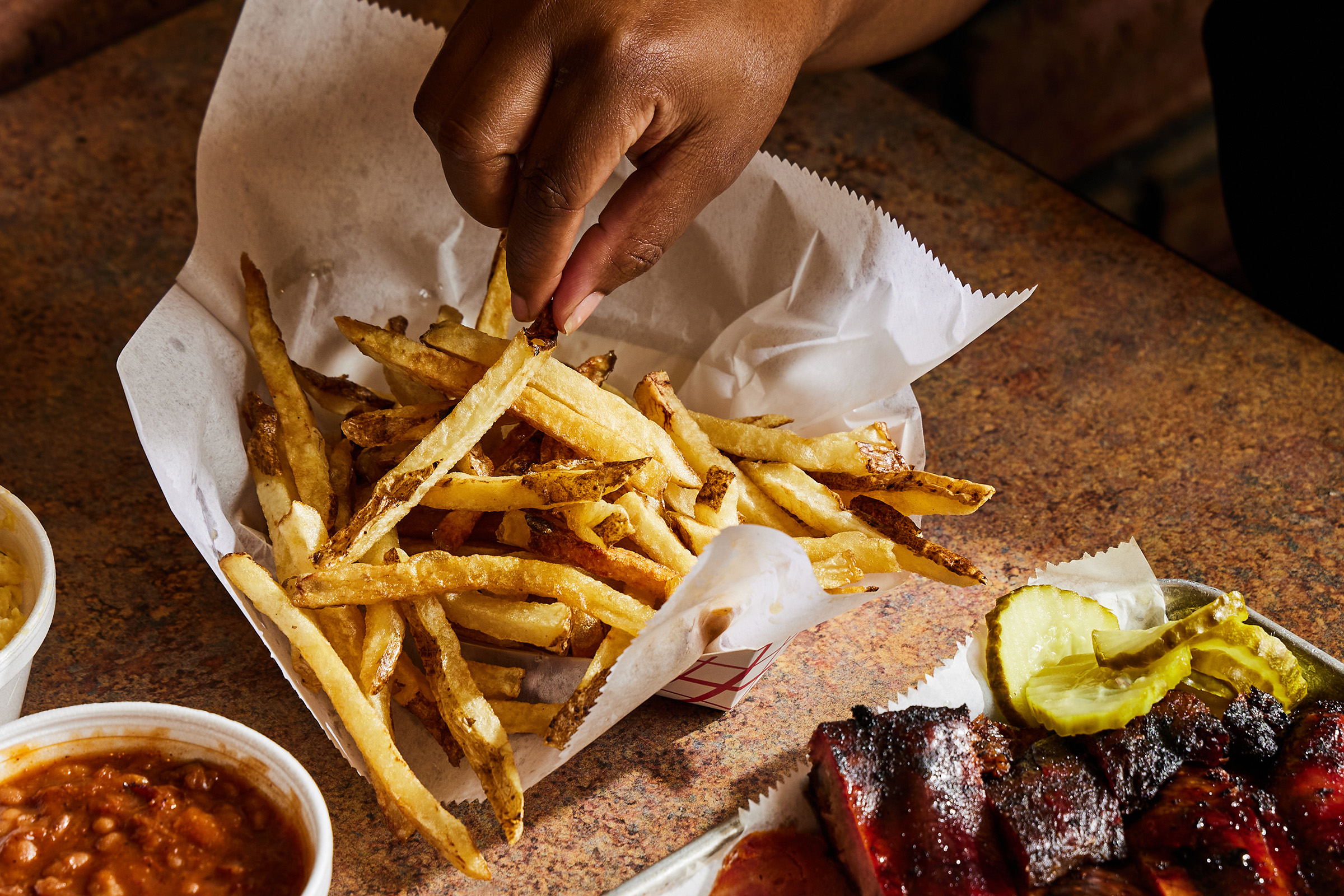
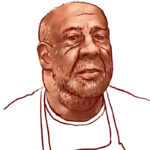
If you want to learn about the history of Kansas City, you could go to a museum. But if you want to taste it, you might as well just go to Big T’s.
In the big brick wall of a smoker behind the counter at Big T’s, the smoke-kissed and spice-rubbed brisket is made the old way. “No gas, no electricity,” Timothy Jones told us the last time we were able to track him down. No temperature gauges, either. It is wood, it is smoke, and it is time. If the beef takes longer to cook today, then today it just takes a little longer.
It is a process you learn to feel more than measure, and Big T learned it from his father, Oscar, who smoked meat for the whole neighborhood in a backyard brick barbecue off Swope Parkway.
There is a quality in cooking that people used to call soul, and Timothy’s father had more than most. Oscar placed second in the American Royal when the American Royal was just a baby. He had his own barbecue spot, Oscar’s, in the 1970s. When the time came, Timothy opened his own pit on Blue Parkway and carried that feeling forward another few generations. He’s well into his sixties now, but his neon orange-red sauce feels much older than he is.
The thin sauce at Big T’s carries the ancient and needling chili heat of the oldest Kansas City barbecue—the kind that arrived with Henry Perry and had no mercy. Timothy won’t tell you what’s in it, and some days he doesn’t even serve it. He’ll serve you a mild and sweet version that’s still a little bit hot and not very sweet.
As the oldest spots like Arthur Bryant’s pass into the hands of branding companies, Big T’s still carries a flame passed torch to torch through generations. Thin-sliced brisket or ham or turkey with character-filled bark that lets you taste the time it spent in smoke. Spice passed on only in families. Sauce that kicks like the butt of a rifle.
And, as we were reminded on a visit one humid June afternoon, some of the best damn french fries in Kansas City.
Jones shut down his second location during the pandemic, leaving him free to double down on his original spot. These days his barbecue is as good as we’ve had it. Come on by, but don’t be late. The brisket will sell out, and then the sticky-good ribs. And then you’ll have to come on back. MK.


When it comes to Kansas City barbecue, Scott Umscheid has popped more cherries than an orchard picker in July.
“Get off the airport, search for ‘restaurants near me,’ and I’m the closest to the airport,” he laughs. “I just am.”
And so diners come in from California or Florida, and Umscheid’s six-year-old Scott’s Kitchen becomes the first barbecue they taste in Kansas City. For all he knows, he’s the first real barbecue they’ve had.
But a funny thing began to happen: In a city full of barbecue, those same tourists would come back around to eat at Scott’s again on their way out of town. Kansas City locals, on their way out to some godforsaken smokeless place, might also do the same.
Take one bite of Umscheid’s thick-cut and thick-barked brisket, rubbed with a farm’s worth of spices before an overnight smoke, and you’ll know why. Over the years since Umscheid opened, that brisket has been dialed tighter than the instruments on an airplane: tender without being soft, moist without losing an iota of integrity.
The secret is no secret. Umscheid does the work. And he puts in the reps. And he refuses to cut a corner.
He still peels and zests twenty-four limes to make each batch of coleslaw. His barbecue sauce has too many ingredients, and still he uses them all. It takes him three hours to make it, the same way it did when he was making it in his home garage. He mixes his own brisket rub, which also has too many ingredients in it.
He cooks his meat overnight and gives it time. That brisket was already terrific four years ago. By now, it’s the song that meat would sing to itself. The ribs pull back to reveal just enough bone to let you hang on, and each bite pulls off gently as you like.
“The restaurant industry is full of temptations to take shortcuts,” Umscheid says. The key is never to indulge them.
But sometimes it’s just a matter of knowing when better is better.
Last year, Umscheid got invited out to Arrowhead Stadium to cook sausage for thousands of fans. He couldn’t stuff all those sausages himself, so he had to ask the excellent sausage makers at Paradise Locker Meats over in Trimble for some help in making Umscheid’s ghost pepper recipe.
Theirs was better.
“It had all the flavors we’ve been making forever, but there was extra flavor,” he says. “They nailed the texture in a way we’ve never been able to consistently do.”
Now, the sausage at Scott’s comes from Paradise. And when Paradise took that ghost pepper recipe to a sausage conference in Iowa, it promptly won first place.
Every time we get off an airplane in Kansas City, we’ll need a damn good reason why Scott’s isn’t one of the first things we eat. MK.
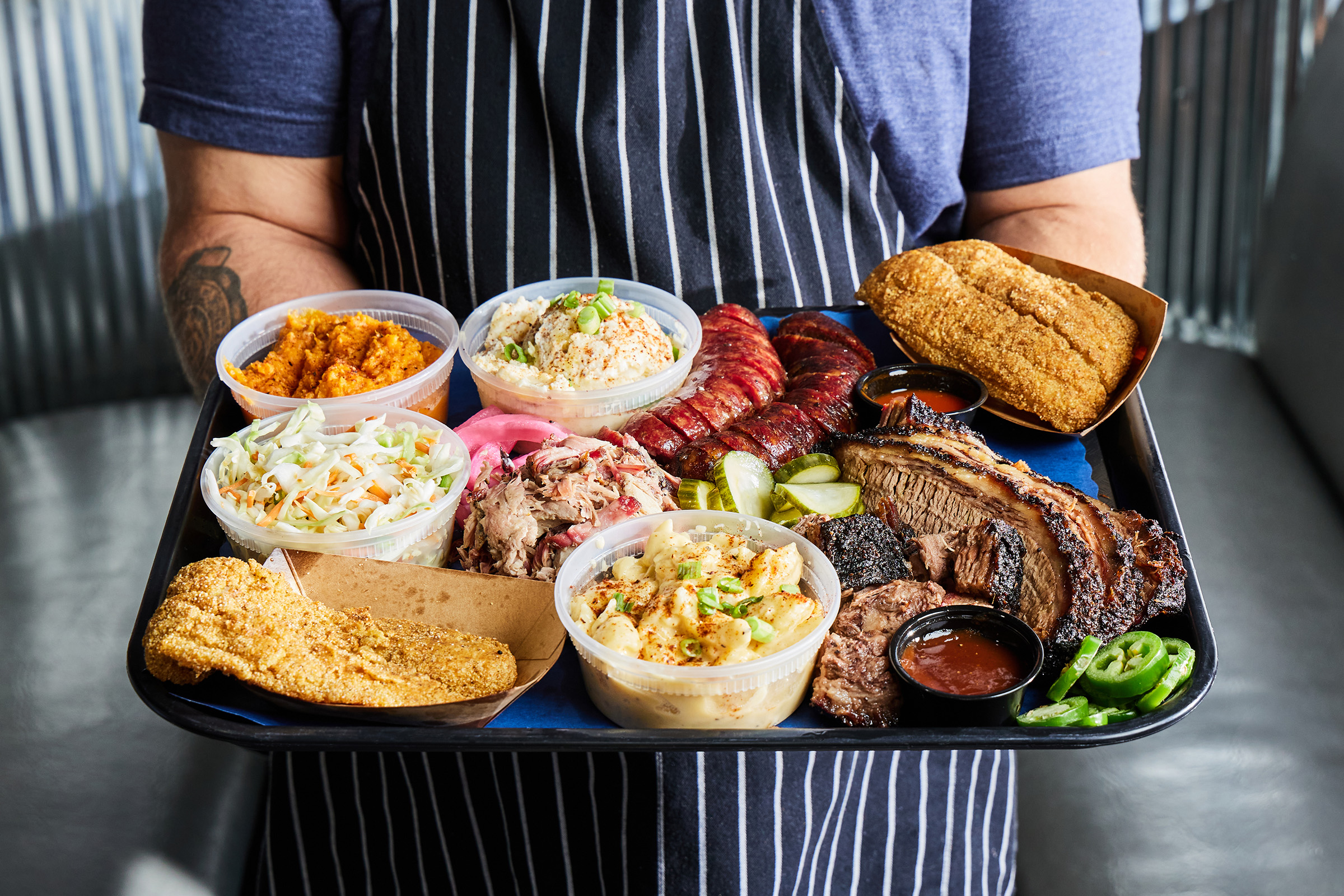

Running a restaurant is very different from running a pop-up. That’s true of the most successful pop-up in Kansas City history, especially when it’s the only notable restaurant opening in Raytown in a generation. And, yes, those honorifics are owed to Harp Barbecue, which kicked off the current renaissance in KC ’cue and owned the top spot on our last two versions of this list.
Harp sits a little lower this time, but not because owner-pitmaster Tyler Harp has lost his touch for world-beating sliced brisket and the best sausages in the city. Rather, the competition has gotten stiffer, and Harp has become a bit less consistent as it’s grown into its own space around the corner from the brewery backroom where it began.
The menu at Harp has expanded and shifted as Harp has worked to capture the attention of a local lunch crowd in Raytown in addition to the fleet of crossover SUVs with Kansas plates you can expect on weekends.
“The best change we made was definitely putting the fish on the menu,” Harp says. “It’s incredibly popular. It started as a way to have something else on weekdays because just brisket and ribs is very expensive and we were trying to reach a crowd that might not have the same budget to buy a pound of brisket for lunch. That’s how it started, and now it’s pretty cool—a lot of people are adding fish to their tray on Saturday.”
That fried fish is swai, a Vietnamese catfish that’s a little milder than its American cousins. It’s part of a menu expansion helped along by a Soul Food Sunday collab with well-known private chef Jayaun Smith. You’ll also see the soul influence on the sides— greens, macaroni and cheese, and mashed sweet potatoes. “In my opinion, at its core, barbecue and soul food are the same thing,” Harp says. “So it just makes sense to dive into it.”
What you won’t see is alcohol. After opening in the back room of Crane Brewing, Harp elected to pass on the easy money of beer sales by not getting a liquor license.
“I wanted to build the culture I wanted to build at a barbecue restaurant, and that’s why I decided not to go that route,” he says. “For me, alcohol is just something I do not prefer to be around, so that’s why we don’t do it. It’s just a personal choice. It’s not part of my vision.”
These decisions make for a slower, lonelier route than those selected by many other upstart restaurateurs. Harp—one of the most introspective and analytical people you’ll find in a professional kitchen—says he knew the path he was picking would require a slow and steady approach.
“To really do what we’re doing in the city we’re doing it in is going to take time,” he says. “I try to tell people you can get into this business if you do it smart and take your time without having to cut up your pie, so to speak.” MC.
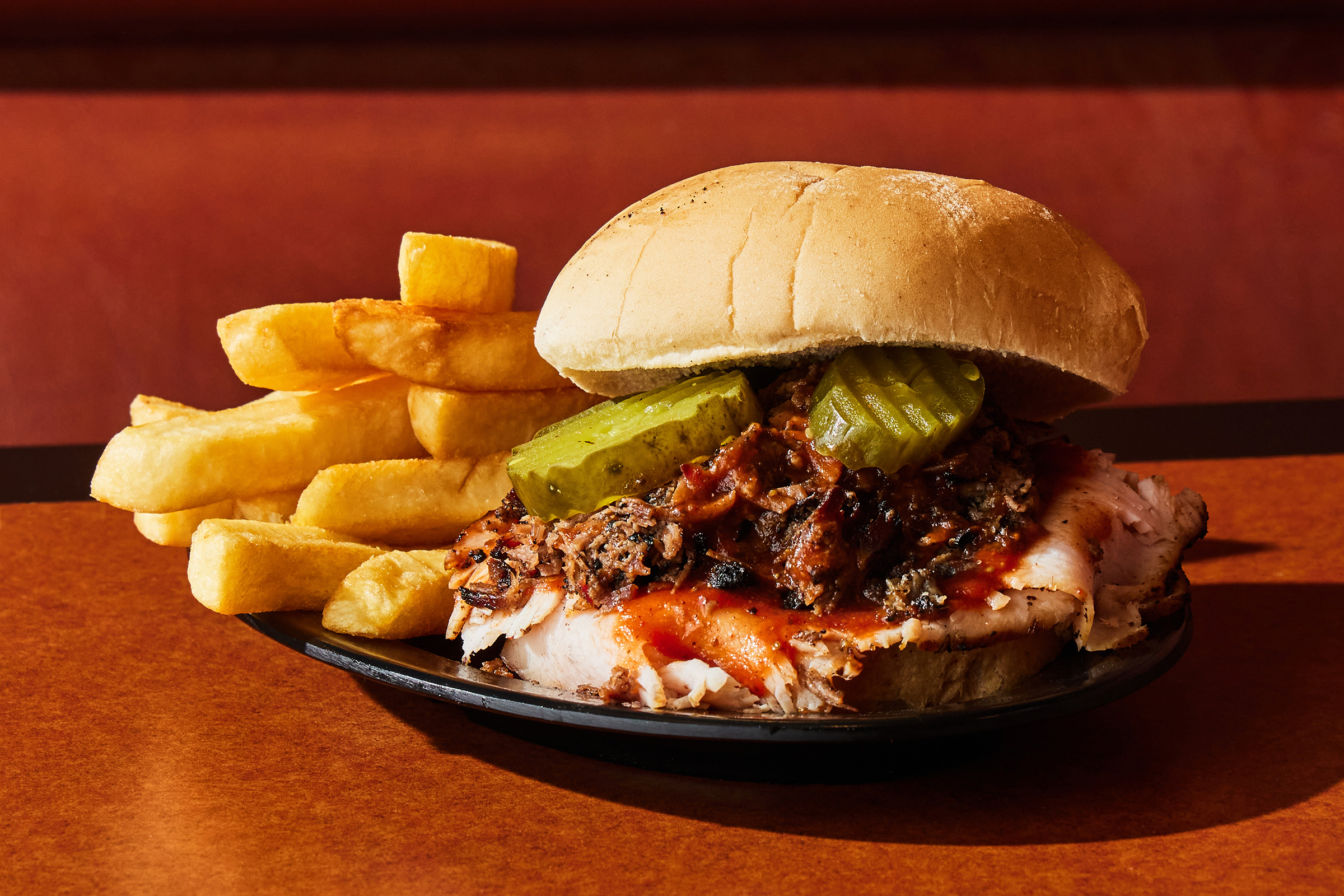

Five locations around KC. We prefer 1325 Emanuel Cleaver II Blvd., KCMO
It’s too easy to take Gates for granted. The iconic KC barbecue chain has been open since the Truman administration, running long hours seven days a week. There’s rarely a long line. The sandwiches are a great value, especially the nooner lunch special. Perhaps it’s better to think of Gates not as another ranked entry on this list but as a city amenity. Gates is not merely a restaurant serving chopped brisket on a bun with the consensus best sauce in a city known for great sauce. It’s an institution that enriches our civic life. Gates has been serving since Satchel Paige was on the mound for the Monarchs. Every walk of life comes here, all greeted with the same cheery-on-paper-but-not-in-practice offer of assistance. The instantly recognizable Struttin’ Man is part of the city’s visual language. They give jobs to felons who might otherwise struggle to find good work. They—this bears repeating—still make the best base barbecue sauce anywhere.
But Gates is on this list not just because every out-of-towner we take here gives a piece of their heart to the city or because any list without it would feel incomplete but because we still love grabbing lunch there as often as anywhere. Gates is the rare restaurant that makes its city a better place to live, and we are so lucky to have it. MC.

The resounding greeting of “Hi, may I help you?” at Gates Bar-B-Q is just as much a trademark as its smokey sauces and tender burnt ends are. Combine that with the local chain’s seventy-plus years in business and you’ve got a beloved KC institution.
Gates owner Ollie Gates is receiving some well-deserved accolades, and not a moment too soon. This past August, Gates got word he’ll be inducted into the Missouri Restaurant Association’s Hall of Fame. Family, friends and the Missouri Restaurant Association surprised Gates at one of his restaurants with the good news. He’ll be formally recognized in February 2024 at the association’s annual gala.
The restaurant has been family-owned every step of the way. Ollie is the son of the restaurant’s original owner, George W. Gates, who opened his shop in 1946 under the name of Gates Ol’ Kentucky. In 1956, after earning an engineering degree and serving in the U.S. Army Corps, Ollie became involved in the family business and helped open several more locations.
Gates Bar-B-Q now has five locations throughout the metro, each one adorned with a red hood and their “Struttin’ Man” logo decked out in a tuxedo.
The engineer turned restaurateur designed his family’s restaurants for better traffic flow and introduced more standardized kitchen practices. Ollie also took the business national, stocking Gates’ famous sauce at local grocery stores and distributing it across the country.
Ollie was also inducted into the American Royal Barbecue Hall of Fame in 2021. And yet, it seems like no amount of recognition can fully eulogize the Gates family legacy. The barbecue chain not only elevated the food genre but played a part in making barbecue bigger than anyone could imagine. —Tyler Shane


2143 Summit Street, KCMO. Sundays only from 11 am to 3 pm
Who is the Night Goat? These days, says Fox and Pearl chef-owner Vaughn Good, it’s probably him.
At first it was a feeling. A bit more than two years ago, the Oklahoma native caught that barbecue bug that always seems to be going around Kansas City.
He began to spend each sweaty Saturday night huddled by a cabinet smoker he’s since swapped for a hickory-and-oak-fueled offset. He checked his brisket by touch, and watched the colors of smoke, a telltale sign of how dirty the wood is burning. And he blasted “Night Goat” by Seattle sludge band Melvins—a song that might be the precise sound of slow-cooking meat.
His barbecue Sunday brunch at Fox and Pearl, Kansas City magazine’s 2019 restaurant of the year, is of course nothing like this feeling. Night Goat is Day Goat, a sunny and perhaps uniquely swanky barbecue experience in this former cowtown, served up with mezcal cocktails or pinkies-up Pimm’s Cups.
The neat-barked and accomplished brisket you’ll find there, if you’re smart, will arrive as part of a two-meat platter that includes a tart, crisp jalapeno salsa and rich duck-fat flour tortillas from local maker Caramelo. Your other meat should be sausage, whether jalapeno-cheddar or an earthy, spicy guajillo beef whose expertly emulsified hand-grind straddles the old cowboy values of character and integrity.
Good will also show you his cheffy bona fides with a biscuit sandwich that balances the fat and char of smoked pork belly with sweet, tart blackberry jam and the floral nuttiness of smoke-cured cheddar.
But the pristine quality of that meat, which Good trims with obsessive-compulsive precision, comes from the time Good spent huddled in the dark.
“Over time, as I’ve been doing this, I’ve kinda become the Night Goat,” Good says.
Soon, your meaty Night Goat experience will start to feel a little more like his.
The Fox and Pearl chef has quietly taken possession of a little speakeasy space in the same building. When they’re done building the place out, Night Goat will indeed happen at night. It will be dark, and underground, and maybe even loud.
“It’s going to be a dive bar with barbecue,” Good says. “It’s definitely not going to look like Fox and Pearl.”
For now, Night Goat barbecue can be had at Fox and Pearl only on Sundays from 11 am to 3 pm. MK.
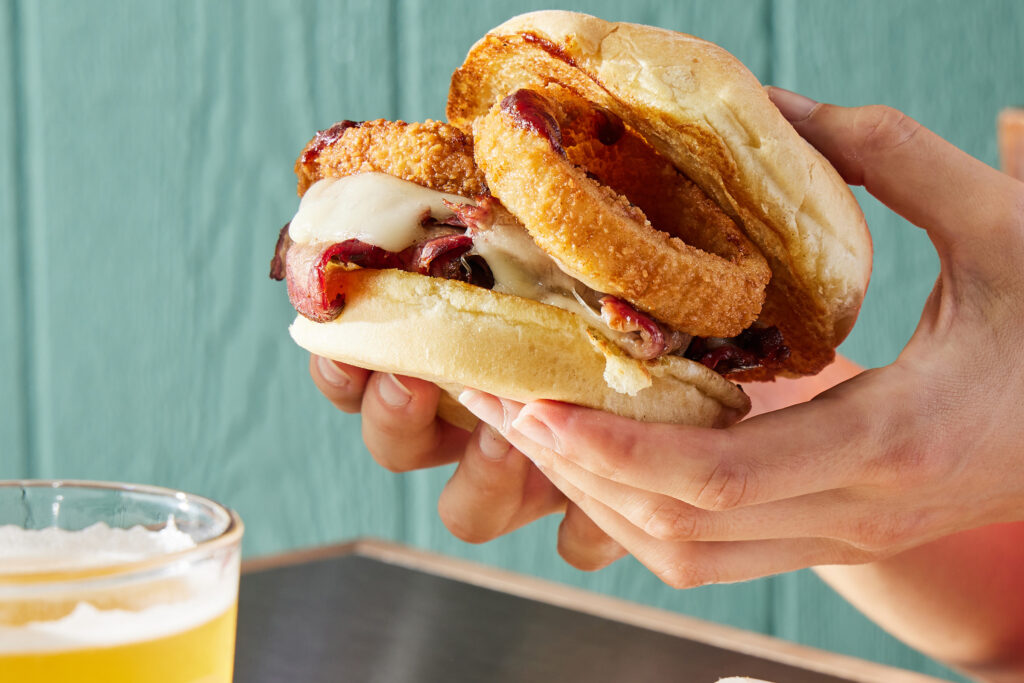


At Joe’s Kansas City this summer, we saw something strange: A table full of large men had gone to the most famous barbecue sandwich spot in Kansas City, and they didn’t order a sandwich.
Instead, they ordered a bunch of thin-sliced smoked brisket, ham, turkey and pulled pork. And they had these meats all spread out on a multitude of trays like a collage made of meat—like something they’d seen on a TV show about craft Texas barbecue.
Do not do this. Joe’s is not Texas barbecue.
The brisket at Joe’s is part of a venerable Kansas City barbecue tradition that finds its true expression in sandwich form. The brisket Z-Man sandwich is what made Joe’s famous, and the brisket Z-Man sandwich is what you should order.
The brisket here is sliced thin because that’s what a sandwich demands, not because nobody here knows how to slice it thick and drop it on a plate like they do in that other state. You smoke the brisket slow, you slice it thin and layer it onto a kaiser roll, you top it with smoked provolone and two onion rings, and you slather it with a sweet, tangy sauce famous for hundreds of miles. And then you eat it with a side of some of the city’s best french fries.
That—the heavenly composition of all of these things—is why people wait in line for longer than seems reasonable. The brisket Z-Man is a form of magic, a food more than the sum of its parts. Consider it a Kansas miracle that Joe’s can make a thousand of these a day and they all taste this good.
Besides, you probably don’t even have to stand in line. Just show up a half hour before Joe’s is officially open and you’ll discover they’re secretly open anyway. The door’s unlocked.
Locals know this the same way they know to order the sandwich—and that Kansas City isn’t Texas. MK.


It’s been a rough few years for almost everyone in the restaurant industry, but you’d be hard-pressed to find any place that has had more turbulence than 3Halves. In April 2021, the brewery navigated the passing of founding brewer Rodney Beagle, one of the most beloved personalities in the KC beer scene. A little over a year later, the brewery just off the town square in Liberty weathered the departure of food partner Jousting Pigs, a standout barbecue pit that elected not to renew its lease in order to focus on a second location at the Legends, which later closed.
And yet everything at 3Halves was great on a recent visit. And the barbecue has never been better.
Owner John Kennebeck was not a professional cook or brewer before opening this spot. Rather, he was in the popcorn business. His family owned K&W Popcorn, based in the Missouri town of Trenton, where Kennebeck started working at age fourteen. The company sold to a competitor, and Kennebeck worked with the buyer for a few years before leaving to do something else.
One Saturday morning, he happened across Aaron Franklin’s barbecue show on PBS. “It completely changed my perspective,” Kennebeck says. “That’s when I really got serious about what I was doing.”
Getting serious can be a humbling journey. “I’ve ruined a metric shit-ton of brisket,” he says. “And I had no real intentions of being in this business. But I had cooked barbecue for catering events and things like that, and I really enjoyed it.”
Rather than open with his own ’cue, Kennebeck teamed with upstart Jousting Pigs. When that operation didn’t renew its lease, 3Halves bought some of the kitchen equipment to make its own food. The plan had been pub fare, but customers expected ’cue. So Kennebeck set to work—but with new smokers, having replaced gas-assisted Ole Hickory’s with wood-only devices made in Dallas by A.N. Bewley Fabricators (see sidebar). “We went from using the Ole Hickory rotisserie-style gas smokers to live fire,” Kennebeck says. “It was kind of a shotgun start for us. We developed all of our recipes and our menu in three days.”
The results are great. Perfectly taut ribs and tender Texas brisket both impressed, and there’s a welcome nod to the pub-grub plan in the form of fried cheese curds and a smash burger.
The key to 3Halves not only surviving but thriving through tumultuous times has been what Kennebeck calls a “collective effort,” with everyone on staff contributing to the menu. The wasabi coleslaw, for example, is a recipe from brewer Bucky Buckingham. Kennebeck is “always back in the kitchen making stuff up”—experimenting with buffalo brisket cheese curds and an ice cream sundae made with hand-churned ice cream and barbecue sauce.
“Some of these are things I’ve played around with over the years, but they weren’t necessarily up to the quality of a restaurant,” he says. “Our entire team pitched in and we tweaked a thing here or a thing there. We’re constantly making changes and trying to find different things we can do.” MC.

There are many ways to smoke meat. As such, you’ll find all types of rigs running in local restaurants, from propane-powered Ole Hickory Pits at spots like Slaps in KCK to the ancient locker-style smoker at LC’s on Blue Parkway. We saw both of those again while making this list, but we’ve admitted a preference for live-fire pits like offset smokers, which give a smokey flavor that’s hard to match over gas or pellets. The pit that surprised us the most, though, is one that’s otherwise unknown in KC but common in Texas. That’s the hyper-efficient log-burning pit built by A.N. Bewley Fabricators of Dallas. The only pit in the area—probably the only one between Chicago and Dallas—can now be found at 3Halves in Liberty. Owner John Kennebeck drove to Dallas to haul back the pit himself. “It was the game-changer for us,” Kennebeck says. “It’s what’s taken us from what I would have considered to be decent barbecue to some of the best in the city.” Bewley pits are super-insulated and very efficient. They’re heated by wood fire with no gas backup—three or four logs can power it overnight. At 3Halves, the fire rarely goes out. They finish cooking at noon and then load it back up at 4 pm. “I don’t think it’s been extinguished completely in a couple of weeks,” Kennebeck says. “The amount of smoke we can get on a piece of meat without over-smoking it is just incredible. It creates a superior product, in my opinion.” We are inclined to agree.